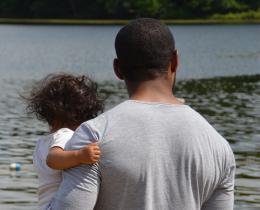ARTICLE

Songwriting As A Radical Act
In October 2018, activist musician Pat Humphries returned to Omega to teach the kind of songwriting workshop that helped launch her career 34 years earlier. Since then, she has inspired hope and transformation for thousands.
Hear Pat Humphries tell her story and listen to her perform her classic song and anthem of the women's movement, "Keep On Moving Forward," with Sandy O.
For activist musician Pat Humphries, it was business as usual. Emma’s Revolution, her musical duo with Sandy O, had just finished its annual pre-Thanksgiving performance near the largest immigrant detention center near the U.S.-Mexico border. It was the 15th year they gathered with this group—sometimes numbering 25,000—to advocate for more humane treatment of immigrants and detainees and protest the policies of the U.S. Army School of the Americas, now renamed the Western Hemisphere Institute for Security Cooperation (WHISC).
"I’m sure they changed the name to make it that much less singable," she quipped, before explaining that WHISC is a taxpayer funded counter-insurgency organization that is hidden in plain sight. "It’s pretty horrific. Very few Americans know of it, but it strikes terror whenever it’s mentioned in Latin America."
In addition to musical performances, the November protest included testimony from detainees and people who’d lost family members as a result of WHISC activities. It is stories like these that feed Humphries’ calling and the alchemy that turns her and others' pain, courage, and resistance into compassion and music.
"I am so inspired by what I hear," she said, referring to a new song she wrote that morning about a woman whose son disappeared crossing the U.S.-Mexico border. "This was a beautiful, multi-racial, multi-ethnic and inter-generational group that gathered from all over the country. We were told that people could hear us from inside the detention center, and that was very gratifying."
Giving Voice to the Silenced
Pat Humphries has been telling the stories that need to be told—about peace and justice, and labor, human, environmental, LGBT, and women's rights—since the early 1980s. Although music was part of the life she shared growing up with four sisters in Ohio, she recognized its power after hearing Neil Young’s “Ohio,” which he wrote in reaction to the 1970 murder of students at Kent State University.
"My sisters and I went to that school and that song was the reason so many people knew about what happened," she said. "It galvanized my curiosity and helped me learn how to look below the surface of a story to see who is telling it and why."
In 1984, with a Take Back the Night rally in mind, Humphries traveled from the mid-West to a songwriting workshop at Omega taught by her friend, activist singer-songwriter Si Kahn. Just out of college and already performing professionally, she was also on the brink of accepting a full-time job when the phrase "never turning back" emerged. It eventually became a refrain in the song "Keep On Moving Forward" which, to her amazement, became an anthem of the women’s movement.
"I was terrified to share that song in the workshop," she said, "but by the end of the week, the whole camp was singing it. Then when I got off the bus for the march in Washington, D.C., in 1985, I heard someone singing it. Later I learned that Judy Small, who was in the workshop with me, took it back with her to Australia, where it also caught on."
In Beijing, in 1995, "Keep On Moving Forward" opened the fourth U.N. Conference on Women.
The Power of a Tiny Slice
Humphries was living in Cambridge, Massachusetts, and performing as a solo act during the late 1980s when she answered a call to sing on the Sloop Clearwater, which brought her to the attention of her longtime idol, Pete Seeger. The next decade not only deepened her connection with Pete and activism, it also gave rise to one of her most beautiful and enduring songs, "Swimming to the Other Side," which was featured on NPR in 2002. By then, she was living in Washington, DC, in order to be on the front lines of the resistance.
"It was a song that just flowed out of me," she explained. "People were hungry for signs of hope and it went off the charts, largely through word of mouth. It hit Amazon just when Eminem’s CD was about to drop and outsold him for three days running," she added proudly. "Being an activist songwriter is a tiny slice of a tiny slice of a tiny slice of the music industry, so it was amazing to see that many people care."
During that time Humphries also solidified her relationship with Sandy O, a classically trained guitarist who was also writing and performing music. The two first connected in 1993 during a WomenFolk concert tour. They clicked immediately and performed occasionally together for about eight years before taking off as a songwriting team in the spirit of Emma Goldman's famous line, "If I can't dance, I don't want to be part of your revolution."
"We say things that are bold and challenging," Humphries said. "It’s our responsibility to tell those stories and touch people who need to be touched. But we also laugh a lot and have learned to step away from the anger and fear into a place of possibility."
With song styles that span from folk, to jazz and funk, to rock, Emma’s Revolution has performed at thousands of events throughout the United States and around the world and garnered prestigious recognition for their original compositions. "If I Give Your Name," a song about undocumented workers who lost their lives on 9/11, won the John Lennon Songwriting Contest Grand Prize; "Peace, Salaam, Shalom," became an anthem of the Iraq war movement; and in 2016, the duo won the first Phil Ochs Award.
In October 2018 Humphries returned to Omega, the place that helped launch her career, to lead a weeklong workshop exploring the craft of songwriting. She offered the participants a space where both experienced and budding songwriters could learn from her intuitive, playful relationship with words and melody.
"I write the songs I need to hear," she said. "Over the years, I’ve heard that they speak to people, that people lean on them during times of transformation and change. I want to be part of transforming this world into a more loving, sustainable place. That’s what keeps me going."


